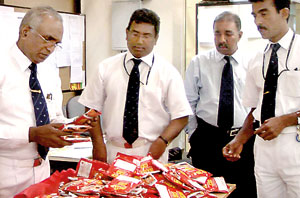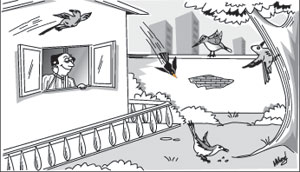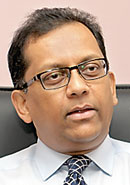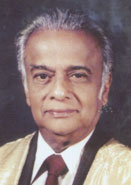News
Waiting game: Hapless heart patients
By Kumudini HettiarachchiThe government health sector is having serious heart trouble.�Even though heart disease is the No. 1 killer in Sri Lanka, the six-storey building of the Kurunegala Teaching Hospital to cater to patients with heart disease, is sans heart (cardiac) surgeons, other staff as well as operating theatres, the Sunday Times learns.
Built in 2008, although it has two cardiologists and a paediatric cardiologist in place, an intensive care unit and a cardiac catheterization laboratory (cath lab), not a single heart surgeon has been appointed and the operating theatres are just shells with no equipment. The special copper tubing needed for the operating theatres has also been stolen, sources said.
This is even though Kurunegala Hospital caters to a large number of men, women and children, from the North Western Province, another pointed out, explaining that cardiology and cardiac surgery go hand in hand and surgery is an essential component in the treatment of numerous patients.
Why is the Health Ministry lethargic in appointing staff and providing equipment to the cardiac surgical unit at Kurunegala, when the consultant cardiologists refer around six patients on average per week for cardiac surgery either to the Kandy Teaching Hospital or the Colombo National Hospital, is the question causing much heartache.
The Sunday Times understands that on average about 500 echocardiograms (ECGs) and more than 10 angiograms are performed weekly at Kurunegala.
The cath lab is also under-utilized as the cardiologists only perform less-complicated procedures as the more complicated ones need a heart surgeon, a source said, adding that now the building is being occupied by other doctors and not heart surgeons.
Heart trouble is not only ailing Kurunegala but the whole country and the Sunday Times decided to focus on this after numerous calls from humble patients and the shocking revelation in Parliament recently that there are 8,130 on the waiting list for heart surgery including 2,400 at the Colombo National Hospital.
By the time a slot is allotted for some of these patients to have heart surgery, their time may be up, as the Sunday Times found. Many relatives who contacted the Sunday Times were vociferous in their anger towards the health authorities, for when the time came for the operations, their loved ones were dead.
Although heart surgeons across the country were tightlipped, the Sunday Times was able to put together a grim picture with regard to heart surgery.Heart surgery is being performed only at the Colombo National Hospital, the Kandy and Karapitiya Teaching Hospitals and the Lady Ridgeway Hospital (LRH) for Children, Colombo, and that too with long waiting lists.
Patients can seek cardiac surgery for a fee at Sri Jayewardenepura General Hospital or at four private hospitals at exorbitant rates, ranging from Rs. 550,000 to more than a million rupees for complicated procedures, the Sunday Times found.
About 5,500 heart operations are performed annually in Sri Lanka and the State health sector handles only 50%. Can the other 50% of patients afford to go to the private sector or are they forced to sell hearth and home to seek heart surgery because they just cannot wait, was the concern in health circles?
“The waiting lists for heart surgery at the four State hospitals will be dependent not only on the heart surgeons available but also whether there are facilities to meet the demand and the consumables needed are available. As such the waiting time could vary from six months to two years,” a source said.
When contacted, Karapitiya Hospital Director Dr. Shelton Perera said their list with about 800 operations pending is due to the cardiothoracic unit being closed for seven months for repairs. He assured that there are no other major issues.
Karapitiya has two cardiologists, two heart surgeons and one paediatric cardiologist, he said.
Kandy Hospital, meanwhile, has three cardiologists, two resident cardiologists and three heart surgeons, according to Director Dr. Gamini Dissanayake, with 5,440 patients being registered since 2006, when the cardiothoracic unit started, up to April this year.
“We have cleared 1,894 of those patients,” he said, explaining that though there was a balance of 3,546, it may be on average less than about 3,000 because some may have got themselves attended to either at Colombo or in the private sector.
Analyzing the situation, a source said the heart surgery units at both the Jaffna and Ratnapura Hospitals were closed between 1970and 1980, due to lack of heart surgeons. Although the Government has set up a cardiology unit and a cath lab at Jaffna, no heart surgeon has been posted there, with people having to come a great distance to Colombo or Kandy for heart surgery.
Opinion was divided over whether the foremost need was a cardiothoracic unit at Kurunegala or Jaffna, with some in health circles pushing for Jaffna, as patients from Kurunegala could easily access Kandy Hospital.
“We hear that a private hospital is due to set up heart surgery facilities in Jaffna,” a doctor pointed out, lamenting the fact that the health authorities did not see it fit to look after the people there.
Delving into the heart problems of the country which have more issues than meets the eye, a senior doctor said that young doctors were also reluctant to specialize in cardiothoracic surgery as opposed to cardiology. The work is long and hard, there are no cardiac surgery facilities in hospitals and cardiology brings in more money because of thriving private practice, he said, adding there is no incentive being provided by the Health Ministry.
Figures from the Postgraduate Institute of Medicine up to 2011 are an eye-opener. While the number of Board-certified Cardiologists since 1980 is 44, there are only 18 Cardiothoracic Surgeons. Since 2008, every year two each and three for 2011 were Board-certified for Cardiology while only one each in 2008, 2009 and 2011 and none in 2010 got the qualification for cardiothoracic surgery.
In recent times, six heart surgeons have left the Government sector, with three joining the private sector and three to work abroad, it is understood.
That is why the Health Ministry must try to retain and encourage those taking up these ‘rare’ specialities, was the view of many.
The Health Ministry has planned to establish cardiothoracic units with two heart surgeons in every province from 2020-25 under its Master Plan. Are these grandiose plans only on paper? Where is the action, a source asked.
These are the questions that the ministry needs to answer, for men, women and children requiring heart surgery are dying for lack of answers as well as action.
Meanwhile, a top-level ministry source conceded that there was an urgent need to address the issue of more cardiothoracic surgical facilities as well as surgeons, while also launching programmes to prevent congenital heart disease and deal with the risk factors of ischaemic heart disease.
A national database is essential on the numbers needing heart surgery, the source said, dding that the disease burden also needed to be addressed, along with the streamlining of the supply of consumables.
Was outdated equipment used in heart operations at Children’s Hospital?�
Were expired oxygenators (artificial lungs) used on children who needed heart surgery at the Lady Ridgeway Hospital (LRH) in Colombo, on the alleged instructions of the Health Ministry?
There was strong speculation that when the LRH ran out of oxygenators used for open-heart surgery about a month ago, the Health Ministry allegedly gave verbal instructions that stocks that had expired more than 12 months ago be used and the doctors were vehemently opposed to this.
The Sunday Times was not able to get confirmation from either the Health Ministry or the LRH about this, but an LRH source stressed that the doctors would never do anything to endanger the lives of children.
When there was a shortage of oxygenators, as the Medical Supplies Division (MSD) was unable to provide stocks, as far as the source knew, a local tender was called and six months of stocks provided two weeks ago, the source said.
The non-issuance of consumables on time by the Health Ministry is severely hindering the performance of heart surgery, the Sunday Times understands.
Even at the National Hospital, open heart surgery for people who weigh more than 50kg had to be postponed as custom tubing packs containing sterile tubes which are used to hook up patients to the heart-lung machine were unavailable, other sources pointed out, while many patients also complained that they were required to purchase some items from outside whenever they had to undergo heart surgery.
The National Hospital has now borrowed about 50 tubing packs from the Kandy Hospital, it is learnt, with health circles wondering whether this is the right thing to do without bringing about a long-term solution to such shortages.
The stocks for 2012 for the National Hospital were ordered in 2010, as is the procedure, but although half the year is gone supplies have not been issued, it is learnt.
Attempts to contact the MSD were futile.
Surgery needed for these �heart problems
Cardiac surgery is an essential component of care for heart disease, the Sunday Times understands. Here are the types of heart disease that need surgery:
- �Ischaemic heart disease needs coronary artery bypass surgery (CABG)
- �Valve disease needs valve repair and valve replacement (implantation of artificial valves)
- Congenital heart disease which afflicts children with birth defects of the heart, those with a hole in the heart or blue babies.
- When the heart is injured or there is a tumour, etc.


















